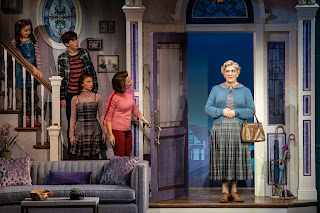“I’m 15 now but sometimes I feel older than my dad,” says eldest child Lydia Hillard (Analise Scarpaci ).
It’s easy to see why. Dad, Daniel Hillard, is an actor who specializes in voices and who seems unable to stop talking or moving. The children enjoy him but his wife, Miranda, played with just the right amount of anger and exasperation by Jenn Gambatese, is worn down. She files for divorce and is granted sole custody, setting in motion Daniel’s inventive way of staying in his children’s lives.
Robin Williams was loved for his antic portrayal of Mrs. Doubtfire in the movie and McClure will be too for his part in the musical. Watching the silliness live, though, is so much more fun.
Karey Kirkpatrick and John O’Farrell have written the musical’s book. Just as in the movie, Daniel comes up with the idea of disguising himself as a nanny when he learns Miranda is looking for one for the children, who also include Christopher (Jake Ryan Flynn), who is about 14, and elementary school-aged Natalie (Avery Sell). Calling Miranda in response to her ad, he employs the voice of an elderly Scottish woman and, after he hangs up, realizes he’s going to have to look like one.
Enter his brother, Frank (the always dependable Brad Oscar) and Frank’s husband, Andre Mayem (J. Harrison Ghee), theatrical costumers who tackle the challenge of transforming Daniel with gusto. In the hilarious number “Make Me a Woman,” the couple envision Daniel as an assortment of glamorous women — Jackie O, Princess Diana and Donna Summer — who materialize in song and dance. When Daniel remembers the voice he used he asks them for someone “older and studier.” They quickly switch their fantasies to Eleanor Roosevelt, Julia Child, Janet Reno and Margaret Thatcher. Choreographer Lorin Latarro has them all dancing together with Daniel, Frank and Andre to pulsing disco-beat music. It’s a wacky delight, with music and lyrics by Wayne Kirkpatrick and Karey Kirkpatrick and lavish costumes by Catherine Zuber.
What they come up with when they put aside those dreams is the padded bodysuit with ample bust and derriere, ankle-length plaid kilt and sweater. A mask gives Daniel a round, pudgy face (makeup and prosthetics design by Tommy Kurzman). Add glasses and a short, tightly curled gray wig and, voila, Mrs. Doubtfire.
Daniel knows just how to work his way into the hearts of the family in his new guise. But it isn’t long before he encounters his first crisis. His by-the-books court liaison, Wanda Sellner (Charity Angel Dawson) approves of Mrs. Doubtfire as appropriate for the children. But trying to play nanny and father come to a head when Wanda wants to talk with Daniel and Mrs. Doubtfire at the same time.
These hijinks take place in Daniel’s apartment (sets by David Korins) Mrs. Doubtfire and Wanda are in the kitchen and Mrs. Doubtfire says she’ll go in the bedroom to get Daniel, who she has said is her brother. (Daniel’s lying had gotten away from him.) From the bedroom, which the audience can see into but Wanda cannot, Daniel calls out in his voice that he’s just getting out of the shower but will be right in. We watch him frantically pull off the clothes, bodysuit, face and wig, and casually walk into the kitchen in his robe.
This is fine until Wanda says she wants to talk to Mrs. Doubtfire again and Daniel has to pull off another switch, only in his haste he knocks the face and wig out of the window. The artful Daniel comes up with a cleaver prop and then, quickly, another. McClure is a marvel.
Daniel has to play this double role again later at a restaurant, dining on one side of the room with the family as Mrs. Doubtfire and meeting with a TV producer as Daniel on the other side. Only this time he’s not so lucky.
This is a musical comedy so I’m not giving anything away in saying that everything works out in the end. The journey to that end is a joy. This is the best movie conversion I have seen in a long time. Gift wrap a couple of tickets for someone you love this Christmas. It’s a sure fit for everyone.









